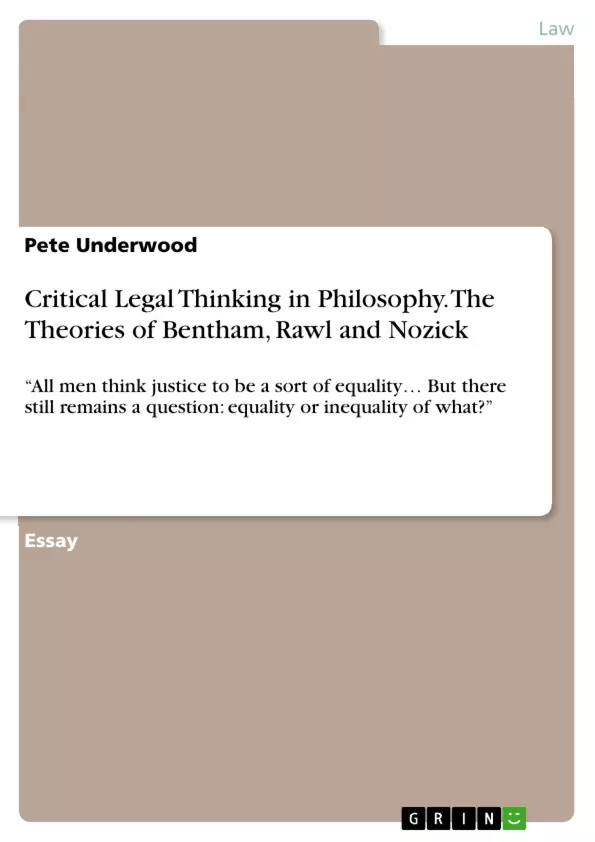Aristotle’s quotation attempts to link the concepts of equality and justice together to ascertain equality or inequality. Justice and equality, however, can be seen as two separate concepts and it is up for debate as to whether justice is a sort of equality. This leads to the more insightful question, what is justice? And how can it be achieved?
In Aristotle’s quotation there is the mention of men, this raises the question; what about women? Surely if justice was linked with equality, which is often linked with nondiscrimination,
it would include women being able to achieve justice. It is important to consider that Aristotle wrote in 300-400BC, when women were subordinate and slaves were permitted, when looking into his theories. Aristotle argued that there were two forms of justice; distribution the giving of honours and money and rectification which was more corrective and righting wrongs. Aristotle also looked at ‘the purpose’ argument, what was the purpose and that satisfaction arises from fulfilling this role.
This essay will look at more recent theorists and their theories and to what justice may be and how to achieve it. In particular, this essay will focus on a utilitarian viewpoint using the theories of Jeremy Bentham and in contrast a Libertarian viewpoint using the theory of Robert Nozick. In addition to these two leading theorists,this essay will also look into the theory of the social contract from modern philosopher John Rawls.
Inhaltsverzeichnis (Table of Contents)
- Introduction
- Jeremy Bentham's Utilitarianism
- John Rawls' Social Contract Theory
- Robert Nozick's Libertarianism
- Theories in Context
- Conclusion
Zielsetzung und Themenschwerpunkte (Objectives and Key Themes)
This essay explores the complex relationship between justice and equality, examining three prominent philosophical theories: utilitarianism, social contract theory, and libertarianism. The essay delves into the arguments of key thinkers such as Jeremy Bentham, John Rawls, and Robert Nozick, analyzing their perspectives on achieving justice and their implications for society.
- The relationship between justice and equality
- The role of pleasure and pain in achieving justice (utilitarianism)
- The social contract as a framework for justice
- The importance of individual rights and liberties (libertarianism)
- The application of these theories in a contemporary context
Zusammenfassung der Kapitel (Chapter Summaries)
- Introduction: This chapter introduces the central question of the essay: what is justice and how can it be achieved? The essay establishes the connection between justice and equality and explores the historical context of this debate, drawing on Aristotle's ideas.
- Jeremy Bentham's Utilitarianism: This chapter examines Jeremy Bentham's theory of utilitarianism, focusing on the concept of "the greatest good for the greatest number." It explores Bentham's idea of pleasure and pain as the driving forces behind human behavior and analyzes how this concept relates to achieving justice.
- John Rawls' Social Contract Theory: This chapter delves into John Rawls' theory of the social contract, highlighting the importance of social cooperation and the creation of a just society. It examines Rawls' concept of the "original position" and the principles of justice he proposes.
Schlüsselwörter (Keywords)
This essay focuses on the philosophical concepts of justice, equality, utilitarianism, social contract theory, libertarianism, pleasure, pain, individual rights, social cooperation, and the application of these theories in contemporary society.
Frequently Asked Questions
How does Jeremy Bentham define justice in Utilitarianism?
Bentham defines justice through the principle of "the greatest good for the greatest number," where human behavior is driven by the balance of pleasure and pain.
What is John Rawls' "Social Contract Theory"?
Rawls proposes that justice arises from social cooperation and the "original position," where individuals agree on principles of fairness without knowing their own status in society.
How does Robert Nozick's Libertarianism differ from Rawls?
Nozick emphasizes individual rights and liberties, arguing that any redistribution of wealth by the state can violate personal freedom, contrasting with Rawls' focus on social cooperation.
What are Aristotle's two forms of justice mentioned in the essay?
Aristotle identified "distribution" (the giving of honors and money) and "rectification" (correcting and righting wrongs) as the two primary forms of justice.
Is there a link between justice and equality in these theories?
The essay explores whether justice is a sort of equality, examining how different theorists link or separate these concepts to achieve a stable society.
- Citation du texte
- Pete Underwood (Auteur), 2013, Critical Legal Thinking in Philosophy. The Theories of Bentham, Rawl and Nozick, Munich, GRIN Verlag, https://www.grin.com/document/294221



